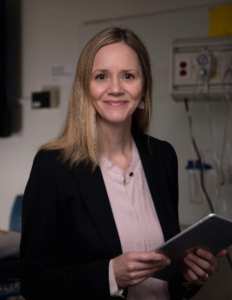
The Women’s Health Research Institute (WHRI) is very pleased to congratulate the recipients of the 2023 Women’s Health Research Institute Catalyst Grants. This competition was funded thanks to the dedicated support of the BC Women’s Health Foundation. One of seven awards is related to capacity-building funds provided by CIHR’s Sex and Gender Science Chair Program and will support a biomedical health research project involving investigations in female animals.
This grant competition provides support for pilot studies in women’s and newborn’s health, which aim to generate preliminary data; test new approaches, methodologies or tools; bring new teams together; and/or support new research in women’s and newborn’s health from established researchers.
This competition has two applicant streams which are evaluated separately from one another: the Academic Researcher stream and the Clinician-Investigator stream.
Academic Researcher Stream Recipients

PROJECT TITLE:
Development of an educational video series on chronic pelvic pain in gynecology for Canadian health care providers-in-training
PRINCIPAL INVESTIGATOR:
A. Fuchsia Howard, Associate Professor, School of Nursing, University of British Columbia
CO-INVESTIGATORS:
Natasha Orr, Paul Yong, Leanne Currie, Karim Qayumi, Margaret Carlyle, Helena Daudt, Rachel Langer, Michelle Lisonek, Navjit Moore and Aimee Hayward
SUMMARY:
Chronic pelvic pain affects approximately 15% of women and an unknown number of gender diverse people. Despite its common and devastating effects, it is often dismissed and mismanaged by healthcare providers due to stigma, normalization and lack of education on this topic. This study will develop an engaging video series on chronic pelvic pain using an iterative development process to address gaps in knowledge. This project will be guided by a group of experts including people with lived experience of chronic pelvic pain, students, researchers, and clinicians. The videos will be implemented into the University of British Columbia medical and nurse practitioner school’s curriculum. Additionally, we will translate research findings to the community. By providing a video series to address gaps in medical education, this project aims to improve health care provider understanding of this complex symptom and ultimately improve care for people with chronic pelvic pain.

PROJECT TITLE:
Exploring trauma-informed technology design among marginalized populations seeking abortion care
PRINCIPAL INVESTIGATOR:
Abdul-Fatawu Abdulai, Assistant Professor, School of Nursing, University of British Columbia
CO-INVESTIGATORS:
Wendy V. Norman, Stephanie Begun, Martha Paynter and Cam Minh Duong
SUMMARY:
Abortion is an essential healthcare service in Canada, with approximately 100,000 abortions provided annually. In recent years, the adoption of digital health has facilitated access to abortion services particularly for marginalized populations who face geographical, systemic and intersecting barriers in access to abortion care. However, there are legitimate concerns of how these technological advances can contribute to, exacerbate, or even create traumatic experiences among marginalized populations who may have prior experiences of trauma.
Recognizing the increasing deployment of digital health in abortion care, any potential unintended consequences may limit their use – further exacerbating inequities in access to abortion services among those with the greatest need. Using an interpretive phenomenological approach, the aim of this proposed research is to explore patient-centered approaches for designing and deploying trauma-informed digital health interventions for abortion care. This research will inform approaches on how to create and deploy emotionally safe digital health interventions that has the least potential of perpetuating, exacerbating or creating trauma among a potentially marginalized population including among survivors of trauma.

PROJECT TITLE:
Qualitatively Exploring Opportunities to Support Older Women’s Sexual Health and Wellbeing in Fraser Health Authority’s Assisted Living Sector
PRINCIPAL INVESTIGATOR:
Valorie Crooks, Professor & Associate Vice-President Research, Department of Geography Simon Fraser University
CO-INVESTIGATORS:
Leah Coppella, Sherin Jamal, Akber Mithani, John Pickering and Janice Sorensen
SUMMARY:
British Columbia’s Fraser Health (FH) Authority houses 31 Assisted Living (AL) communities, home primarily to seniors who can maintain independence while receiving some care. Currently, FH has 1,281 AL residents. Of those, 883 (68.9%) are women. Our pre-research exploration focused on sexually transmitted and blood-borne infection (STBBI) prevention in AL has involved conversations with administrators and care providers. It has become clear that residents are rarely conceptualized as having sexual health needs. Thus, most AL communities lack policies around intimacy or more broadly supporting sexual well-being, let alone STBBI prevention. Advancing our exploratory focus on STBBIs, here we propose a pilot study to understand opportunities for better supporting older women’s sexual wellbeing in FH’s AL.
First, we will conduct a focus group with AL leaders to facilitate dialogue about policies and practices around women’s sexual wellbeing. Second, we will conduct 10 walking interviews with Care Aides or other front-line staff to identify barriers and facilitators to sexual wellbeing in AL environments. Third, we will conduct up to 20 unstructured interviews with older women AL residents to support the development of a conceptual framework for understanding what constitutes sexual wellbeing in this care context. We will co-leverage our CIHR Planning Grant pre-research activities and the pilot study run through this WHRI Catalyst Grant to form the basis of a larger program of research focused on advancing opportunities for better sexual health care and STBBI prevention for the older women who make up the majority of AL residents in FH.
Clinician-Investigator Stream Recipients

PROJECT TITLE:
Home Assessment of Blood Pressure in Pregnancy (HABPY)
PRINCIPAL INVESTIGATOR:
Karen Tran, Clinical Assistant Professor, Department of Medicine, University of British Columbia; General Internist, Vancouver General Hospital and BC Women’s Hospital
CO-INVESTIGATORS:
Wee Shian Chan, Nadia Khan, Allison Thiele, KS Joseph and Sarka Lisonkova
SUMMARY:
Hypertensive disorders of pregnancy (HDP) is due to high blood pressure (BP) during pregnancy. This can lead to complications to mom and baby. Detecting and treating high BP can prevent these problems. One solution is home BP telemonitoring (HBPT). We will conduct a study to see the feasibility, safety, and acceptability of HBPT program among pregnant people with HDP.
Pregnant people with HDP will measure their BP at home and send BP readings to their doctor using an App. Their doctor will monitor their BP and adjust their medications. To test for feasibility, we will calculate how many people are interested, join, complete, or drop out from the study. We will see how many develop very high BP to ensure safety of HBPT. Participants will complete surveys about their experience. If we can get better control of BP in pregnancy, we can potentially improve the health of moms and babies

PROJECT TITLE:
High-Resolution MRI versus Standard Pelvic MRI Protocol for Pre-operative Evaluation of Rectosigmoid Deep Infiltrating Endometriosis
PRINCIPAL INVESTIGATOR:
Emily Pang, Clinical Assistant Professor, Department of Radiology, University of British Columbia; Abdominal Radiologist, Vancouver General Hospital
CO-INVESTIGATORS:
Mohamed Bedaiwy and Caroline Lee
SUMMARY:
Rectosigmoid deep infiltrating endometriosis (DIE) is a condition where tissue similar to the lining of the womb invades the wall of the large bowel. This is estimated to occur in 5-12% of individuals with endometriosis and can cause significant pelvic pain including pain with menstrual cycles, bowel movements, and sexual activity. While traditionally diagnosed at the time of surgery, there has been a recent trend towards diagnosis using non-invasive imaging methods such as MRI or advanced ultrasound. However, access to advanced ultrasound is limited to specialized centers in Canada whereas MRI is potentially more accessible. Rectosigmoid DIE can be difficult to visualize using the current standard pelvic MRI settings.
The information required is similar to that needed for large bowel cancer, which use high resolution MRI settings specially adapted to the large bowel. We propose that modifying the standard pelvic MRI settings to include similar high-resolution images could allow better evaluation of the extent of rectosigmoid DIE for surgical planning. We believe that the results of this study have the potential to allow earlier diagnosis of large intestinal endometriosis, provide clearer images of the disease to allow the surgeons to plan surgery more effectively, and improve access to imaging for women who have limited access to specialized centers for advanced endometriosis ultrasound.

PROJECT TITLE:
Assessing the impact of the novel Neonatal Complex Care Program through family-reported experiences
PRINCIPAL INVESTIGATOR:
Emily Kieran, Clinical Assistant Professor, Department of Pediatrics, University of British Columbia; Neonatologist, BC Children’s and BC Women’s Hospitals
CO-INVESTIGATORS:
Julia Charlton and Manon Ranger
SUMMARY:
Children with complex medical needs (CMN) are those with complex chronic illnesses necessitating specialized care, functional disability, significant family-identified service needs, and high health care utilization. At BC Women’s Hospital Neonatal Intensive Care Unit (NICU), babies with CMN are cared for in a dedicated unit by a multidisciplinary Neonatal Complex Care Team (NCCT). The NCCT focuses on proactive management of an infant’s unique care needs together with their family caregivers, promoting consistency of care and preparing for the transition to community. The NCCT works to empower the family caregivers (caregivers) so that upon NICU discharge they are the champions of their child’s care. The experiences of caregivers with the NCCT have not been assessed but are critical to understand the impact of the NCCT.
Our aim is to assess the NCCT model of care through family-reported measures. We will be using surveys and semi-structured interviews to probe for caregivers’ experiences and perspectives during their NICU stay and the initial post-discharge period. We will explore topics related to their satisfaction with NCCT-focused care, transitions from acute to complex care and discharge home, confidence in navigating the medical system, mental and psychosocial well-being, and out-of-pocket expenses. This crucial information can help us identify aspects of the program that were most valuable to caregivers, area of improvement, and opportunities for future clinical and research directions.
Biomedical Project Involving Investigations in Female Animals Recipient

PROJECT TITLE:
Defining the impacts of preventing insulin excess in a mouse model of polycystic ovary syndrome (PCOS)
PRINCIPAL INVESTIGATOR:
Nicole M. Templeman, Assistant Professor, Department of Biology, University of Victoria
CO-INVESTIGATORS:
None
SUMMARY:
Abnormally elevated insulin is associated with many detrimental health effects, including obesity, type 2 diabetes, and reduced female reproductive health. It is a common feature of polycystic ovary syndrome (PCOS), the most prevalent female reproductive disorder. PCOS is characterized by a wide range of symptoms that include disrupted hormone levels, irregular menstrual cycles, cysts on the ovaries, and often metabolic impacts such as elevated insulin. However, it is not yet known if preventing an elevation in insulin levels can effectively protect against the onset of PCOS, or alleviate its symptoms. Using an experimental manipulation to generate PCOS-like features in a mouse model of genetically reduced insulin, we will determine how suppressing insulin levels affects a spectrum of reproductive and metabolic characteristics of PCOS. We will also determine if limiting insulin levels improves fertility, pregnancy outcomes, incidence of gestational diabetes during a pregnancy with PCOS, and the health of the offspring. Since high insulin levels can be normalized in humans via lifestyle changes, we anticipate that our work could inform effective strategies to better manage symptoms of PCOS by limiting excess insulin.